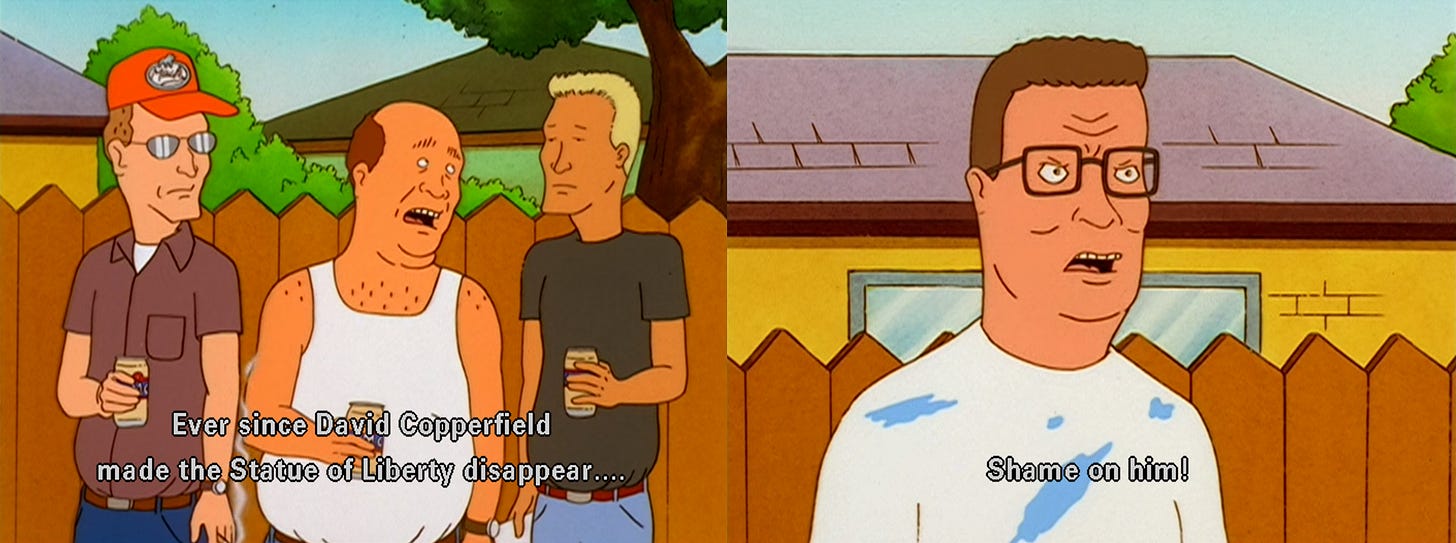Hi everyone. I’ve had a whirlwind couple of days of stress, so I hope you’ll forgive a much shorter newsletter today.
With that in mind, I thought I’d change things up and write about what makes me happy these days: that’s right, I’m talking about the Fox animated series King of the Hill, which ran from 1997 until 2010.
The show has been in the news lately because a reboot is in the works for Hulu from the show’s original creators, Mike Judge and Greg Daniels, and with the original voice cast signed on. In terms of possibly ill-advised reboots of once-beloved TV shows, I certainly have more faith in this one than, say, Kelsey Grammer’s desperate return to Frasier, but nevertheless I want to explain why I think the original run of Hill has stood the test of time.
King of the Hill is occasionally positioned as a show that spoke to conservative America. The series follows the Hill family, led by patriarch Hank, as he struggles to accept his son, Bobby, a boy who “ain’t right,” and who loves his wife, Peggy, despite his dedication to traditional gender roles. In 2015, Scott Whitlock wrote for the conservative National Review that the show was a reminder to conservatives after the 2012 presidential election that not all of the media is liberal-leaning. He notes that Hank is never directly labeled a Republican, but that he makes his politics clear, with an example from the season 7 premiere, about “hipster” parents versus the Hill’s more traditional approach, where a liberal father is angry at getting called “Ronald Reagan,” and Hank responds (not getting that it was an insult), “Yeah, don’t call him that!”
Of course, a core part of that joke is Hank’s obliviousness, and very often throughout the series, his stubborn commitment to tradition is precisely what is satirized. Whitlock further notes that co-creator Judge positioned the show as a social critique rather than a political one, but Whitlock calls bullshit: “Whatever Mr. Judge wants to be called, King of the Hill showcased conservative values in a deep, authentic manner.”
He is, in a way, correct. The reason the show works is because it clearly has a lived-in understanding of American conservatism, and does not generally look down on its characters. Judge could probably be more appropriately termed a libertarian, but nevertheless, the show’s humour largely works because it’s a self-parody, or rather, the people behind the show are poking fun at people like them, and generally doing so without a bone to pick.
As scholar Ethan Thompson has written, the show “has walked a line between laughing at and laughing with Texans.” Moreover, the Texas of the show (it takes place in the fictional town of Arlen) “is less important as a geographic entity somewhere between ‘the South’ and ‘the West’ than as a discursive structure used to explore social values that are changing in modern life.” The result is a series that is realistic in its satire and marinated in cultural authenticity. It may seem like a reach, but it reminds me of Robert and Michelle King’s The Good Fight, which simultaneously laughed at and with #Resistance liberals and was so good at it because it was a life and a milieu that the Kings and their writers clearly lived or were well-acquainted with.
This isn’t to say that the show never revealed less-savoury cultural tendencies, as others have explored its approach to race in particular. As Neil Huff concludes for Pop Matters, though, “The show argues for neither easy racial reconciliation nor for the alleviation of white guilt through a convenient ‘we’re all friends’ morality, but simply presents audiences with real Americans in real situations, and leaves the questions to be pondered upon.”
The best satire, I think, comes from familiarity, and from a fundamental respect for the people or the characters involved. King of the Hill almost always struck that careful balance, but one has to wonder what new episodes could look like within a cultural and political landscape that looks much different than it did when the show left the airwaves. Yep.
Ephemera
One of the more cogent takes I’ve seen on the TikTok situation, by Ivy Yang for The China Project.
Great episode of the Citations Needed podcast about the book bans happening now, and the history of public libraries, one of the very last truly public spaces we have left.
Read Letterboxd superstar Sally Jane Black’s words on attacks on trans youth and what to do about it.
Movie Recommendation: Recently there was a prompt on Twitter to claim which movie you believe you love more than anyone else on the planet. It’s an interesting question, because many of the movies I love the most—Mulholland Dr, Pulse, Johnny Guitar—are adored by many, and who am I to claim the top spot? Instead, I chose Frank Borzage’s I’ve Always Loved You. Released in 1946, it is one of the most rapturous films I have ever seen, from the volcanic romance at its centre to the incredible musical sequences where the leads perform together. It’s also a troubling tale of mistaking identity for mastery, conflating art with love. It’s rather underseen, so I feel comfortable saying I may just love it more than any other living person. It’s available for free, in very good quality, on YouTube.





